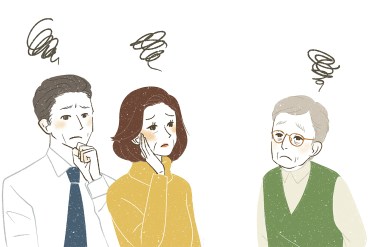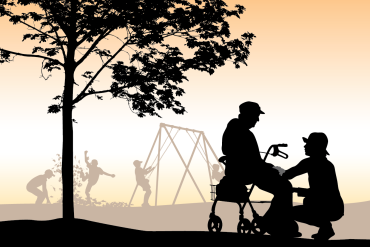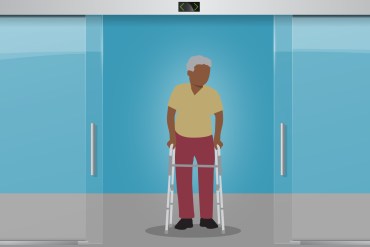What To Do If Your Home Health Care Agency Ditches You
If you’re told Medicare’s home health benefits have changed, don’t believe it: Coverage rules haven’t been altered and people are still entitled to the same types of services. All that has changed is how Medicare pays agencies.
What The 2020s Have In Store For Aging Boomers
On the bright side, advances in medical science and a push for healthier lifestyles might extend the quality of life for aging boomers. Among clouds on the horizon: ageism, strained long-term care services and the need to work well past retirement age.
Cómo cuidar a los padres mayores cuando no quieren ayuda
Desafortunadamente, ni la paciencia, ni la compasión, ni la tolerancia dan resultado en algunas circunstancias conflictivas, pero hay formas de generar buena comunicación.
Parenting Your Aging Parents When They Don’t Want Help
Relationships between adult children and their parents can fray with age. Experts offer help on how loved ones can preserve the love and negotiate those tension-filled final years.
The Health Care Promises We Cannot Keep
Family caregivers pledge to fulfill their loved ones’ end-of-life wishes. But too often circumstances change, and they must break their word and guard against breaking hearts ― including their own.
As His Wife’s Caregiver, A Doctor Discovers What’s Missing At Health Care’s Core
Harvard psychiatrist Arthur Kleinman shed his “veil of ignorance” during 11 years serving as the primary family caregiver for his wife, who had a rare form of early Alzheimer’s disease. In a new book, “The Soul of Care,” he offers suggestions for transforming health care ― just as caregiving transformed him.
When Caring For A Sick Spouse Shakes A Marriage To The Core
A long illness creates a real risk: that the relationship will be undermined and essential emotional connections lost.
Cuando cuidar al cónyuge enfermo afecta los cimientos del matrimonio
El riesgo es que los matrimonios se vean afectados por la enfermedad y se pierdan las conexiones emocionales esenciales.
La delicada tarea de quitarle el teléfono inteligente a un adulto mayor
Según el Centro de Investigación Pew, el 73% de los adultos mayores de 65 años usaron Internet en 2019, en comparación con el 43% en 2010.
Drumbeat Builds For A Peace Corps Of Caregivers
The notion of a national program to tend to the day-to-day needs of a booming older population has circulated for years. Now, there are grants ― and grit ― behind it.
Cuerpos de Paz para cuidar y ofrecer compañía a adultos mayores
Este otoño, líderes del proyecto invitarán a organizaciones de todo el país a presentar propuestas para atender las necesidades “no médicas” de los adultos mayores.
The Delicate Issue Of Taking Away A Senior’s Smartphone
Knowing when — and how — to limit a loved one’s access to digital devices is akin to taking their car keys.
Qué pueden hacer hospitales y consultorios para que los adultos mayores estén más seguros
Para los adultos mayores, especialmente para los que son frágiles, los centros médicos pueden ser difíciles de navegar y, a veces, hasta peligrosos.
In Search Of Age-Friendly Health Care, Finding Room For Improvement
Simple alterations — like better signs, seating, parking or door design — can make it easier for older patients to navigate health care facilities. Here are several changes doctors’ offices, clinics and hospitals could make.
Feds Pave The Way To Expand Home Dialysis — But Patients Hit Roadblocks
What changes are needed to bring home dialysis to more patients — especially older adults, the fastest-growing group of patients with serious, irreversible kidney disease? We asked nephrologists, patient advocates and dialysis company officials for their thoughts.
What The Trump Home Dialysis Plan Would Really Look Like
It takes more than an executive order to shift kidney disease patients from dialysis centers to home care. These patients show it takes discipline, skill, will and support.
La charla que tienen que tener los adultos mayores con sus médicos antes de una cirugía
Muchas veces los médicos no hablan con sus pacientes y familiares sobre los riesgos potenciales y las complicaciones que se pueden presentar durante o después de una intervención.
The Talk Seniors Need To Have With Doctors Before Surgery
Surgeons are rethinking the old notions of “informed consent.” With older patients especially, a push is on to talk candidly about what a surgery will do, its risks and how it will affect their quality of life.
Medicamentos comunes pueden generar síntomas similares a los de la demencia
Se estima que 1 de cada 4 adultos mayores toma medicamentos anticolinérgicos, una amplia gama de drogas utilizadas para tratar alergias, insomnio, incontinencia urinaria, mareos, asma y Parkinson, entre otros.
Common Medications Can Masquerade As Dementia In Seniors
A wide variety of medications used to treat allergies, insomnia, leaky bladders, diarrhea, dizziness, motion sickness, asthma, Parkinson’s disease, chronic obstructive pulmonary disease and psychiatric disorders can interfere with cognition in older patients.



















